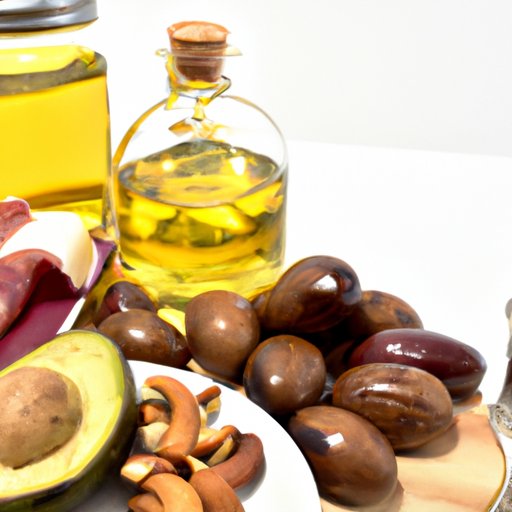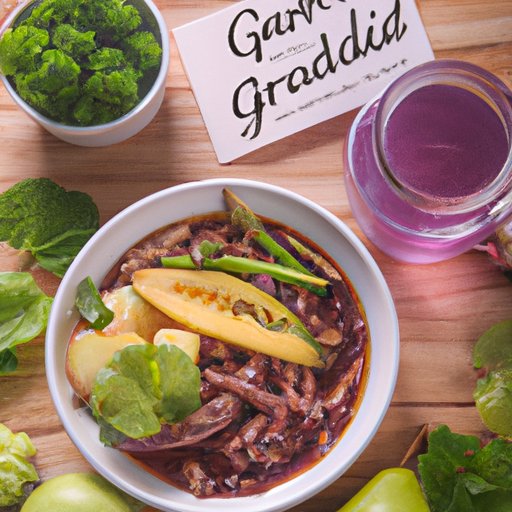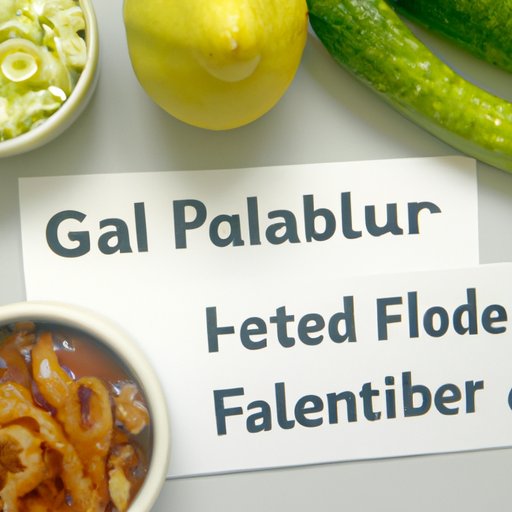Introduction
Gallbladder surgery is an important medical procedure that can help alleviate pain and discomfort caused by gallstones. After the surgery, it is essential to make dietary changes in order to ensure optimal recovery. This article will explore what to eat after gallbladder surgery, including low-fat, high-fiber foods, healthy fats, and probiotics. Meal planning tips for the first few weeks post-surgery will also be discussed, as well as advice on incorporating foods that promote digestive health.
Exploring Low-Fat, High-Fiber Foods to Eat After Gallbladder Surgery
Low-fat, high-fiber foods are an important part of any diet, but they are especially important for those recovering from gallbladder surgery. Examples of low-fat, high-fiber foods include whole grains, fruits, vegetables, legumes, nuts, and seeds. Eating these foods can help reduce cholesterol levels, regulate blood sugar levels, and promote weight loss. Additionally, these foods are rich in essential vitamins and minerals, which can help support overall health and wellbeing.
The benefits of eating low-fat, high-fiber foods don’t end there. These foods are also easier to digest than other types of food, which can help reduce the risk of developing abdominal pain or indigestion after surgery. Furthermore, consuming these types of food can help prevent constipation, which is a common side effect of gallbladder surgery.
Creating a Meal Plan for the First Few Weeks Post-Surgery
Creating a meal plan for the first few weeks post-surgery is an important step in ensuring a successful recovery. It is important to focus on eating small, frequent meals that are low in fat and high in fiber. Additionally, it is important to avoid eating large meals, as this can put extra strain on the body and increase the risk of developing abdominal pain or nausea.
When creating a meal plan, it is important to focus on eating nutrient-dense foods and avoiding processed foods, as these may contain hidden ingredients that can aggravate digestive issues. Additionally, it is important to stay hydrated by drinking plenty of water throughout the day. This can help keep the body nourished and promote healthy digestion.
It is also important to remember to practice moderation when it comes to eating after gallbladder surgery. Eating too much at one time can put extra strain on the digestive system, so it is important to pay attention to portion sizes and listen to your body’s hunger cues.

The Benefits of Eating Healthy Fats After Gallbladder Surgery
Eating healthy fats is an important part of any diet, but it is especially important for those recovering from gallbladder surgery. Healthy fats can help provide the body with essential nutrients, such as omega-3 fatty acids, which can help reduce inflammation and promote overall health and wellbeing. Examples of healthy fats include olive oil, avocados, nuts, and seeds.
When adding healthy fats to your diet, it is important to practice moderation. Eating too much fat at one time can put extra strain on the digestive system, so it is important to consume these foods in moderation and listen to your body’s hunger cues.
Adding Probiotics to Your Diet After Gallbladder Surgery
Probiotics are beneficial bacteria that can help promote digestive health. Consuming probiotic-rich foods or taking a daily probiotic supplement can help restore balance to the gut microbiome, which can help reduce abdominal pain and bloating. Examples of probiotic-rich foods include yogurt, kefir, kimchi, sauerkraut, and miso.
Probiotics can also help reduce inflammation and boost the immune system. Taking a daily probiotic supplement can help ensure that the gut microbiome is balanced and functioning properly, which can help promote overall health and wellbeing.

Incorporating Foods that Promote Digestive Health After Gallbladder Surgery
In addition to consuming probiotic-rich foods, it is also important to incorporate foods that promote digestive health into your diet. Examples of digestive-promoting foods include ginger, turmeric, chamomile tea, papaya, and pineapple. These foods can help reduce inflammation and support the digestive system, which can help reduce abdominal pain and bloating.
Additionally, these foods can help promote regular bowel movements and reduce the risk of constipation. Eating a balanced diet that includes these types of foods can help ensure that the digestive system is functioning properly and that the body is getting the nutrients it needs to heal and recover.
Conclusion
Recovery from gallbladder surgery can be a long and challenging process, but making dietary changes can help ensure a successful recovery. Eating low-fat, high-fiber foods, healthy fats, and probiotic-rich foods can help reduce abdominal pain and bloating and promote digestive health. Additionally, creating a meal plan and incorporating foods that promote digestive health can help ensure that the body is getting the nourishment it needs during the recovery process.
Making healthy dietary choices after gallbladder surgery can help ensure a successful recovery and promote overall health and wellbeing. With patience and dedication, you can make lasting changes to your diet that will help you feel your best.
(Note: Is this article not meeting your expectations? Do you have knowledge or insights to share? Unlock new opportunities and expand your reach by joining our authors team. Click Registration to join us and share your expertise with our readers.)
